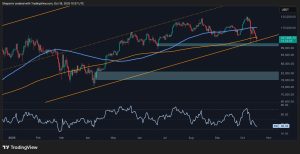Central banks across the world are hiking up their interest rates, some by record margins, as they attempt to bring inflation lower. At the same time, the crypto market is continuing to rally higher. Is crypto a bellwether for the global equity markets?
Crypto puts on a spurt
With ethereum leading the way, the crypto market is starting to turn what many thought was a dead cat bounce, into a sustained rally that could even end up being a trend reversal.
The combined crypto market cap has put on $146 billion since it dipped below $1 trillion in mid-June. It’s still a long way short of the highs of around $3 trillion that were achieved in November 2021, but the start of the recovery has arguably been made.
Ethereum has far outpaced bitcoin this time around. At time of writing, the number 2 ranked cryptocurrency by market cap is flirting with the $1700 level. This is a major level, and consolidation above this, together with piercing through a trendline in force since early April, would potentially mean a surge up through $2000.
Bitcoin is also climbing nicely, although the fact that the price is moving within a bear flag should send a warning to speculators to be extremely cautious. The top of the bear flag could be around $25,000 to $25,500.
Central banks use their tools
We are always told gravely by leaders of central banks, such as U.S. Federal Reserve Chairman Jerome Powell, that the bank will deploy its ‘tools’ in order to manage the economy.
We all now know that that particular toolbox only has one or two tools in it, and they consist of interest rate hikes or lowers, and quantitative easing or tightening. Extremely blunt tools to say the very least.
Nevertheless, central banks around the world are using them in an increasingly desperate effort to somehow get a cap on inflation.
Today, the Reserve Bank of India raised its repo rate 50 basis points to 5.4% in an attempt to stem inflation that has been above an upper tolerance level of 6% for the last 6 months.
Yesterday, the Bank of England raised interest rates 0.5% to 1.75%, the biggest increase in interest rates that has been seen in the country over the last 27 years.
As well as admitting that the rise would have the largest effect on the least well off, Governor Bailey was unrepentant, saying:
“If we don’t act now to prevent inflation becoming persistent, the consequences later will be worse, and will require larger increases in interest rates,” he said. “Returning inflation to its 2% target remains our absolute priority, no ifs, no buts.”
Crypto first to dive but first to surge
In the face of decreasing economic activity, higher interest rates, and a very uncertain geopolitical scene, perhaps inflation will now begin to turn. Given that crypto was the first asset class to take a nosedive, wouldn’t it be likely that it will be the first to take the path to recovery?
Disclaimer: This article is provided for informational purposes only. It is not offered or intended to be used as legal, tax, investment, financial, or other advice.






















